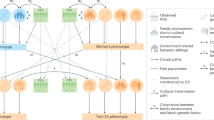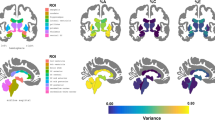Abstract
Twin studies are frequently cited in support of the influence of genetic factors for a wide range of psychiatric conditions and psychological trait differences. The most common method, known as the classical twin method, compares the concordance rates or correlations of reared-together identical (MZ) vs. reared-together same-sex fraternal (DZ) twins. However, drawing genetic inferences from MZ–DZ comparisons is problematic due to methodological problems and questionable assumptions. It is argued that the main theoretical assumption of the twin method—known as the “equal environment assumption”—is not tenable. The twin method is therefore of doubtful value as an indicator of genetic influences. Studies of reared-apart twins are discussed, and it is noted that these studies are also vulnerable to methodological problems and environmental confounds. It is concluded that there is little reason to believe that twin studies provide evidence in favor of genetic influences on psychiatric disorders and human behavioral differences.
Similar content being viewed by others
REFERENCES
Myerson A: The Inheritance of Mental Diseases. Baltimore, Williams & Wilkins, 1925.
Kallmann F: The Genetics of Schizophrenia: A Study of Heredity and Reproduction in the Families of 1,087 Schizophrenics. New York, J. J. Augustin, 1938.
Faraone S, Tsuang, M: Methods in psychiatric genetics. In: Tsuang M, Tohen M, Zahner G, eds. Textbook in Psychiatric Epidemiology. New York: Wiley-Liss, 1995, pp. 81-134.
Galton F: The history of twins as a criterion of the relative powers of nature and nurture. Journal of the Anthropological Institute of Great Britain and Ireland 5:391-406, 1875.
Siemens H: Die Zwillingspathologie [Twin Pathology]. Berlin, Springer Verlag, 1924.
Jackson D: A critique of the literature on the genetics of schizophrenia. In: Jackson D, ed. The Etiology of Schizophrenia. New York, Basic Books, 1960, pp. 37-87.
Joseph J: Don Jackson's “A critique of the literature on the genetics of schizophrenia”-A reappraisal after 40 years. Genetic, Social, and General Psychology Monographs 127:27-57, 2001.
Joseph J: Not in their genes: A critical view of the genetics of attention-deficit hyperactivity disorder. Developmental Review 20:539-567, 2000.
Bouchard T: Genetic and environmental influences on adult personality: Evaluating the evidence. In: Hettema J, Deary I, eds. Basic Issues in Personality. Dordrecht, The Netherlands: Kluwer Academic Publishers, 1993, pp. 15-44.
Gottesman I, Shields J: Schizophrenia and Genetics: A Twin Study Vantage Point. New York, Academic Press, 1972.
Kendler K, Neale M, Kessler R, et al: Parental treatment and the equal environment assumption in twin studies of psychiatric illness. Psychological Medicine 24:579-590, 1994.
Morris-Yates A, Andrews G, Howie P, Henderson S: Twins: A test of the equal environments assumption. Acta Psychiatrica Scandinavica 81:322-326, 1990.
Rose R: Twin studies and psychosocial epidemiology. In: Tsuang M, Kendler K, Lyons M, eds. Genetic Issues in Psychosocial Epidemiology. New Brunswick, NJ: Rutgers University Press, 1991, pp. 12-32.
Scarr S: Environmental bias in twin studies. Eugenics Quarterly 15:34-40, 1968.
Scarr S, Carter-Saltzman L: Twin method: Defense of a critical assumption. Behavior Genetics 9:527-542, 1979.
Kringlen E: Heredity and Environment in the Functional Psychoses: An Epidemiological-Clinical Study. Oslo, Universitetsforlaget, 1967.
Rosanoff A, Handy L, Plesset I, Brush S: The etiology of so-called schizophrenia psychoses. American Journal of Psychiatry 91:247-286, 1934.
Carey G, DiLalla D: Personality and psychopathology: Genetic perspectives. Journal of Abnormal Psychology 103:32-43, 1994.
Lyons M, Kendler K, Provet A, Tsuang M: The genetics of schizophrenia, In: Tsuang M, Kendler K, Lyons M, eds. Genetic Issues in Psychosocial Epidemiology. New Brunswick, NJ, Rutgers University Press, 1991, pp. 19-52.
Kendler K: Overview: A current perspective on twin studies of schizophrenia. American Journal of Psychiatry 140:1413-1425, 1983.
Lytton H: Do parents create, or respond to, differences in twins? Developmental Psychology 13:456-459, 1977.
Kendler K: The genetics of schizophrenia: A current perspective. In: Meltzer H, ed. Psychopharmacology: The Third Generation of Progress. New York, Raven Press, 1987, pp. 705-713.
Joseph J: The equal environment assumption of the classical twin method: A critical analysis. Journal of Mind and Behavior 19:325-358, 1998.
Pam A, Kemker S, Ross C, Golden R: The “equal environment assumption” in MZ-DZ comparisons: An untenable premise of psychiatric genetics? Acta Geneticae Medicae et Gemellologiae 45:349-360, 1996.
Joseph J: The genetic theory of schizophrenia: A critical overview. Ethical Human Sciences and Services 1:119-145, 1999.
Harris J: The Nurture Assumption: Why Children Turn Out the Way They Do. New York, The Free Press, 1998.
Segal N: Entwined Lives: Twins and What They Tell Us About Human Behavior. New York, Dutton, 1999.
Wright L: Twins: And What They Tell Us About Who We Are. New York, John Wiley & Sons, 1997.
Wright W: Born That Way. New York, Alfred A. Knopf, 1998.
Hearnshaw L: Cyril Burt: Psychologist. Ithaca, NY, Cornell University Press, 1979.
Bouchard T, Lykken D, McGue M, et al: Sources of human psychological differences: The Minnesota study of twins reared apart. Science 250:223-228, 1990.
Kamin L: The Science and Politics of IQ: Potomac, MD, Lawrence Erlbaum Associates, 1974.
Farber S: Identical Twins Reared Apart: A Reanalysis. New York, Basic Books, 1981.
Dusek V: Bewitching science. Science for the People 19:19-22, 1987.
McGue M, Bouchard T: Adjustment of twin data for the effects of age and sex. Behavior Genetics 14:325-343, 1984.
Joseph J: Separated twins and the genetics of personality differences: A critique. American Journal of Psychology 114:1-30, 2001.
Rose R: Separated twins: Data and their limits. Science 215:959-960, 1982.
Author information
Authors and Affiliations
Rights and permissions
About this article
Cite this article
Joseph, J. Twin Studies in Psychiatry and Psychology: Science or Pseudoscience?. Psychiatr Q 73, 71–82 (2002). https://doi.org/10.1023/A:1012896802713
Issue Date:
DOI: https://doi.org/10.1023/A:1012896802713




